More than a million Americans live full-time in their recreational vehicle, or RV, and you should know that many of them use their mobility andtheir ...
You might consider targeting a niche, such as a family style RV park.
We earn commissions if you shop through the links below. Read more
Written by: Carolyn Young
Carolyn Young is a business writer who focuses on entrepreneurial concepts and the business formation. She has over 25 years of experience in business roles, and has authored several entrepreneurship textbooks.
Edited by: David Lepeska
David has been writing and learning about business, finance and globalization for a quarter-century, starting with a small New York consulting firm in the 1990s.
Published on June 23, 2023

Investment range
$705,800 - $1,212,300
Revenue potential
$400,000 - $500,000 p.a.
Time to build
6 – 12 months
Profit potential
$160,000 - $200,000 p.a.
Industry trend
Growing
Commitment
Full-time
Vital aspects to consider when kicking off your RV park:
You May Also Wonder:
Is an RV park profitable?
RV parks can be profitable businesses, depending on factors such as location, amenities, pricing, occupancy rates, and operational efficiency.
What happens during a typical day at an RV park?
A typical day at an RV park involves activities such as check-ins and check-outs of RV guests, maintenance and upkeep of park facilities, provision of amenities, assisting guests with inquiries and needs, and social interactions among guests.
What is the growth potential of an RV park?
The growth potential of an RV park varies depending on factors such as market demand, location, competition, and expansion opportunities. Parks in popular destinations, with limited competition, or with potential for amenities expansion may have higher growth potential.
What type of business is an RV park?
An RV park is primarily a hospitality and leisure business. It falls under the category of accommodation services, catering to recreational vehicle owners and travelers seeking a temporary or long-term place to park their RVs or campers.
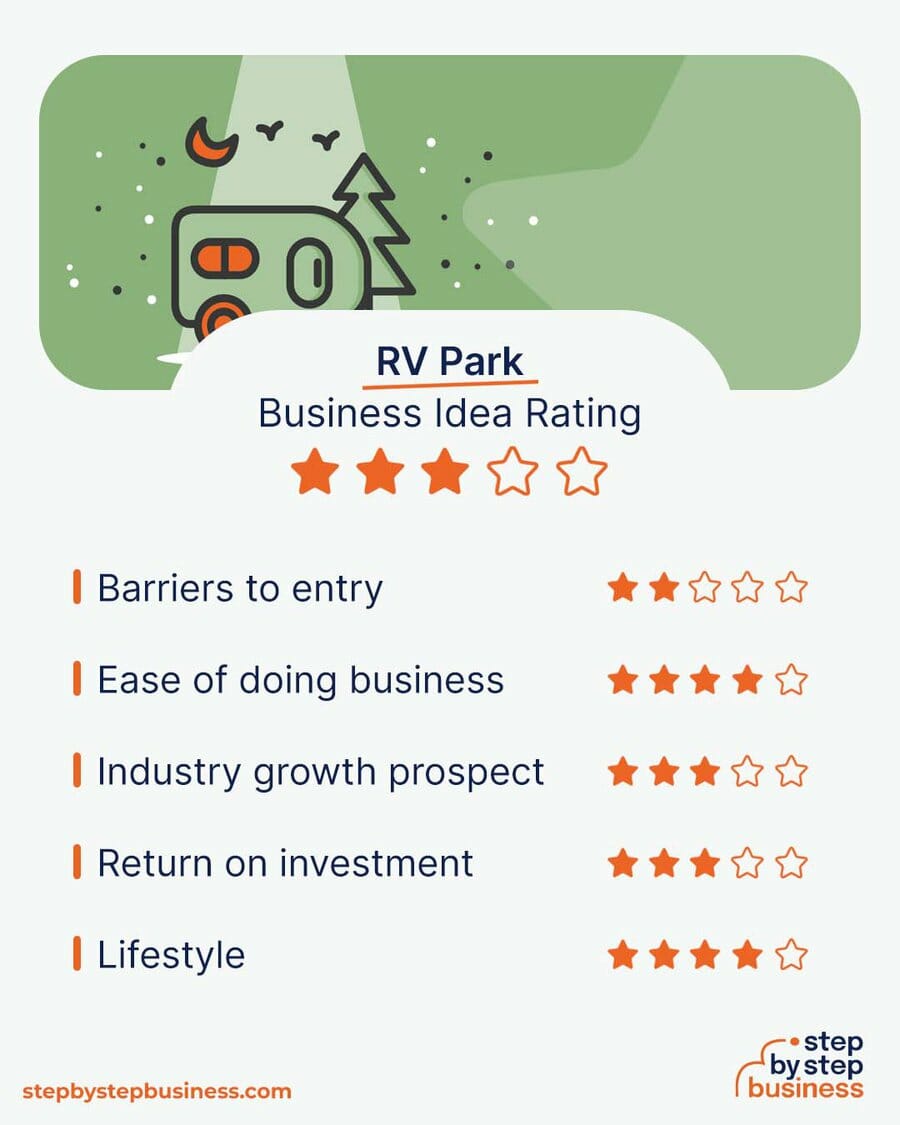

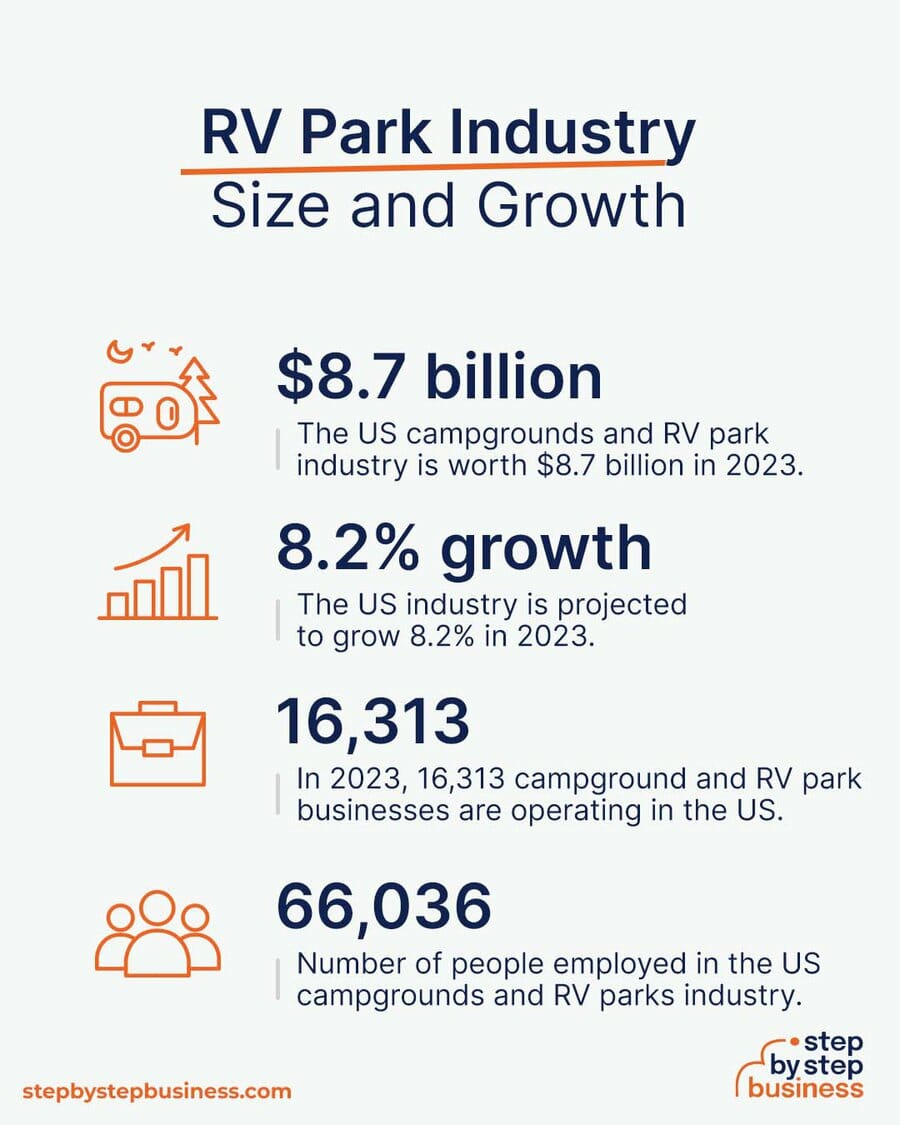
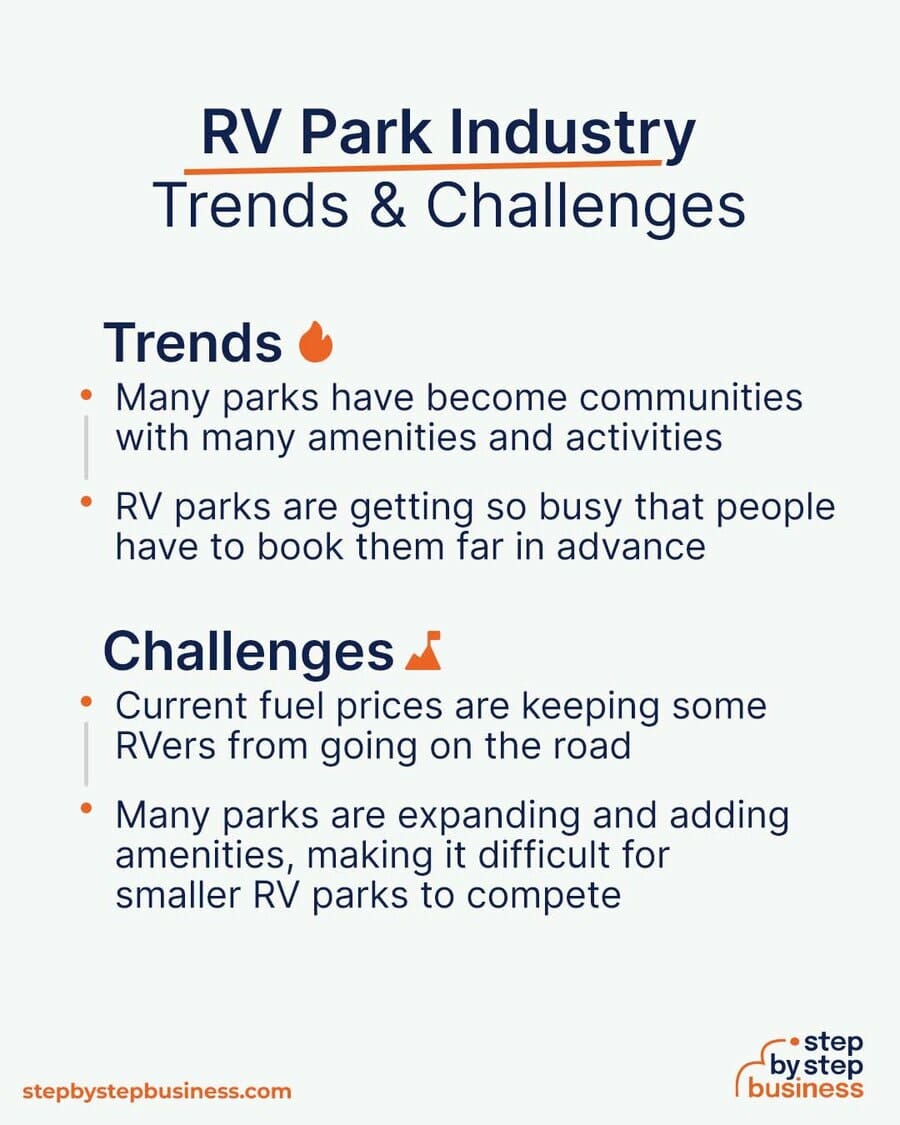
Trends
Challenges
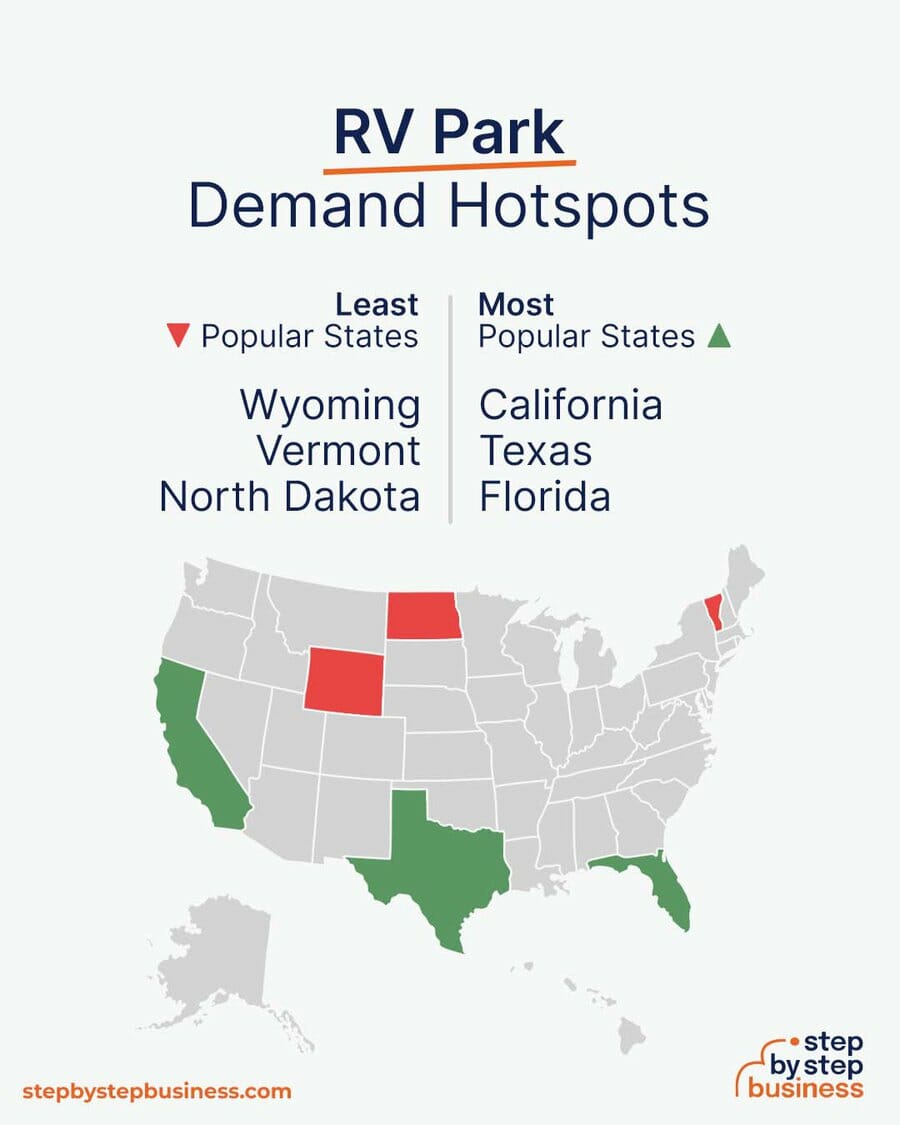
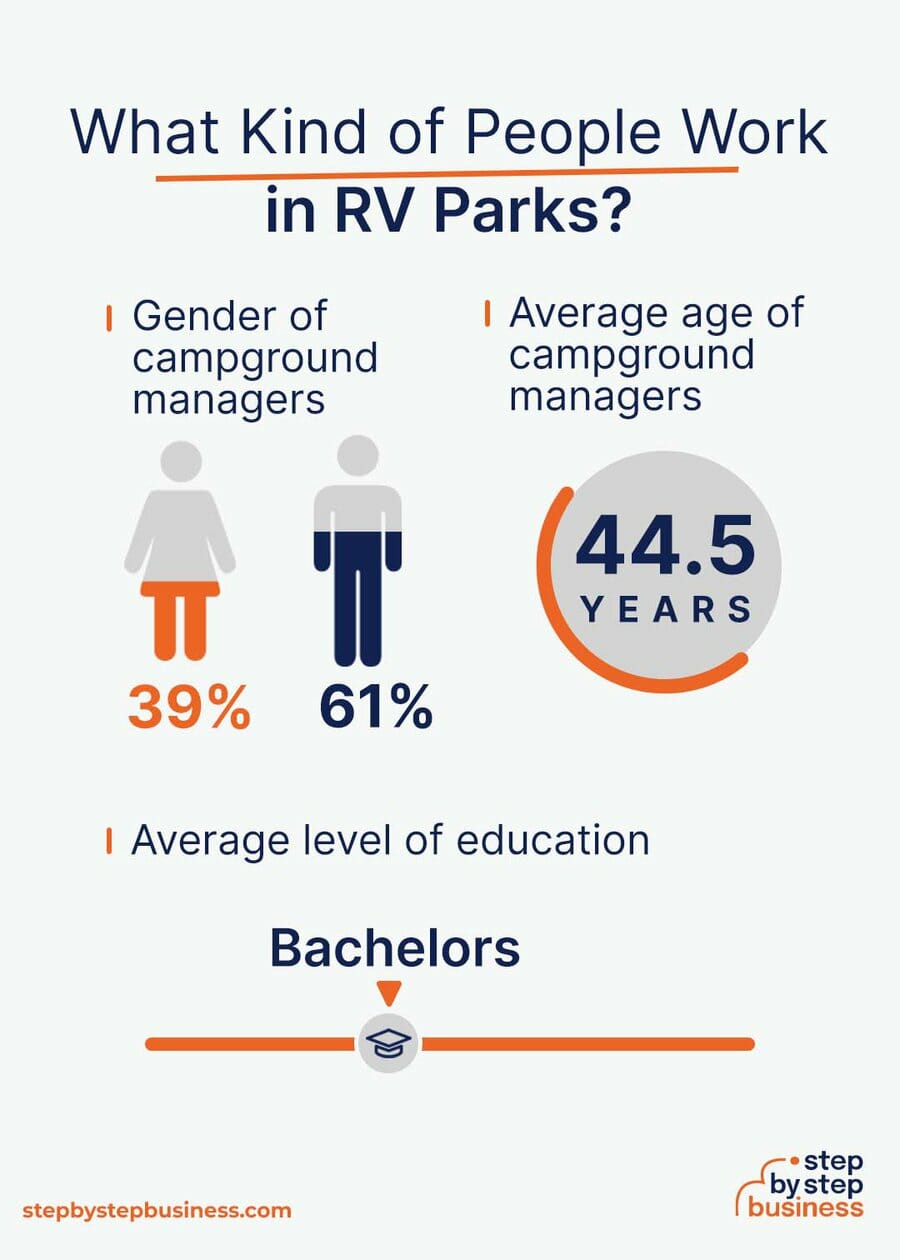
Startup costs for an RV park range from $700,000 to well over $1 million. The largest cost is the preparation of the campsites with hookups, gravel roads, and RV pads. These costs also assume that you’ll add amenities such as a pool.
| Start-up Costs | Ballpark Range | Average |
|---|---|---|
| Setting up a business name and corporation | $100 - $500 | $300 |
| Business licenses and permits | $100 - $300 | $200 |
| Insurance | $100-$500 | $300 |
| Website | $500 - $1,000 | $750 |
| Land | $20,000 - $50,000 | $35,000 |
| Preparation of 30 - 50 campsites | $600,000 - $1,000,000 | $800,000 |
| Office facility construction | $50,000 - $100,000 | $75,000 |
| Amenities construction such as a pool | $30,000 - $50,000 | $40,000 |
| Sales and marketing budget | $5,000 - $10,000 | $7,500 |
| Total | $705,800 - $1,212,300 | $959,050 |
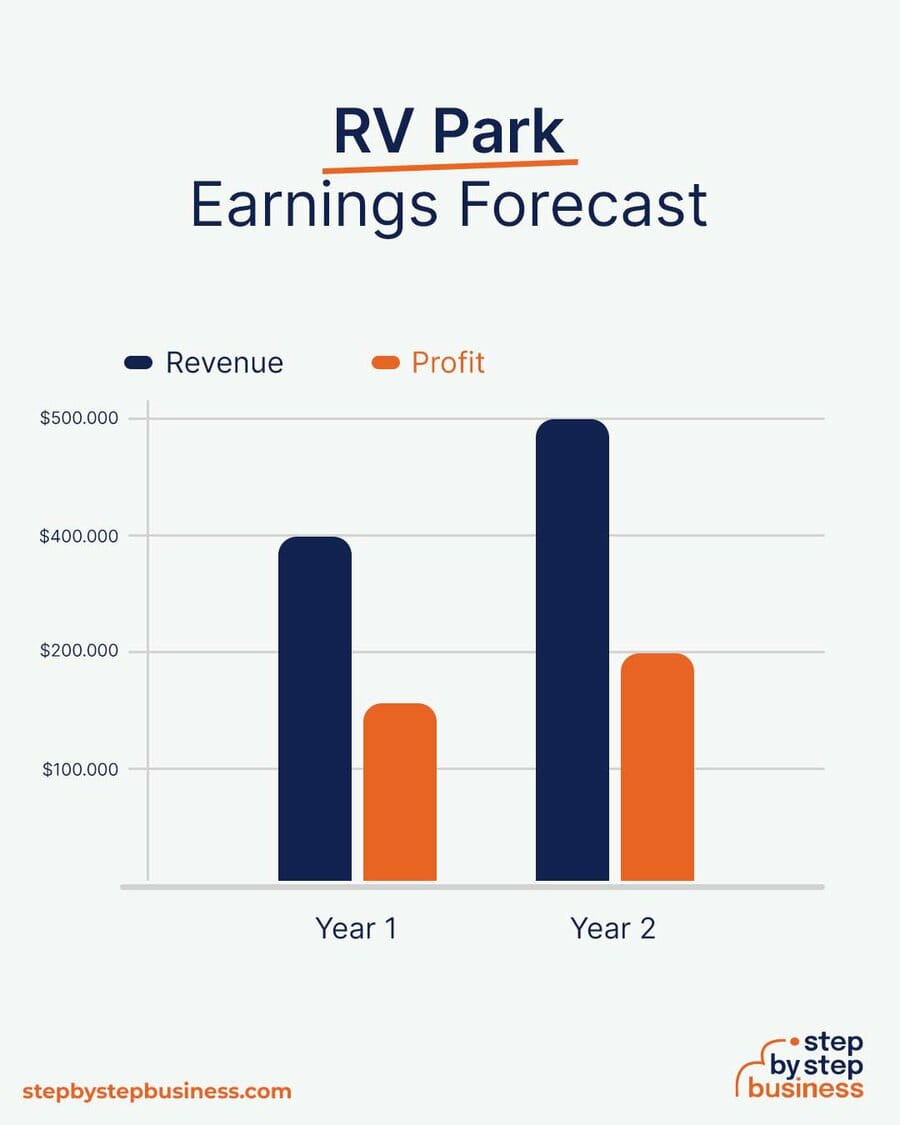
You can likely charge around $50 per night for each site. These calculations will assume that you’ll have 50 sites. Your profit margin should be around 40%.
In your first year or two, you might have an average of 40 sites rented for 200 nights per year, bringing in $400,000 in revenue. This would mean $160,000 in profit, assuming that 50% margin.
As you gain traction, you might have 40 sites rented 250 nights a year. With annual revenue of $500,000, you’d make a tidy profit of $200,000.
There are a few barriers to entry for an RV park. Your biggest challenges will be:

Now that you know what’s involved in starting an RV park, it’s a good idea to hone your concept in preparation to enter a competitive market.
Market research could give you the upper hand even if you’ve got the perfect product. Conducting robust market research is crucial, as it will help you better understand your customers, your competitors, and the broader business landscape.
Research RV parks in your area to examine their services, price points, and customer reviews.
This should identify areas where you can strengthen your business and gain a competitive edge to make better business decisions.
You’re looking for a market gap to fill. For instance, maybe the local market is missing an RV park with an indoor pool or one that has an arcade.
You might consider targeting a niche, such as a family style RV park.
This could jumpstart your word-of-mouth marketing and attract clients right away.
In addition to renting the campsites, you could generate revenue from an arcade, or by selling snacks, beverages, and camping merchandise.
Your prices should be based on market prices in your area and the number of amenities you offer, but also on your operating costs.
Once you know your costs, use this Step By Step profit margin calculator to determine your mark-up and final price points. Remember, the prices you use at launch should be subject to change if warranted by the market.
People of all ages like to RV so you should market on both Instagram and Facebook.
To find suitable land, you should engage with a real estate agent to help you with your search. Here are some factors to consider when choosing the right location for an RV park business:

Here are some ideas for brainstorming your business name:
Once you’ve got a list of potential names, visit the website of the US Patent and Trademark Office to make sure they are available for registration and check the availability of related domain names using our Domain Name Search tool. Using “.com” or “.org” sharply increases credibility, so it’s best to focus on these.
Finally, make your choice among the names that pass this screening and go ahead and reserve your business name with your state, start the trademark registration process, and complete your domain registration and social media account creation.
Your business name is one of the key differentiators that sets your business apart. Once you pick a name, reserve it and start with the branding, it’s hard to switch to a new name. So be sure to carefully consider your choice before moving forward.
Here are the key components of a business plan:

If you’ve never created a business plan, it can be an intimidating task. You might consider hiring a business plan specialist to create a top-notch business plan for you.
Registering your business is an absolutely crucial step — it’s the prerequisite to paying taxes, raising capital, opening a bank account, and other guideposts on the road to getting a business up and running.
Plus, registration is exciting because it makes the entire process official. Once it’s complete, you’ll have your own business!
Your business location is important because it can affect taxes, legal requirements, and revenue. Most people will register their business in the state where they live, but if you are planning to expand, you might consider looking elsewhere, as some states could offer real advantages when it comes to RV parks.
If you’re willing to move, you could really maximize your business! Keep in mind, it’s relatively easy to transfer your business to another state.
Business entities come in several varieties, each with its pros and cons. The legal structure you choose for your RV park will shape your taxes, personal liability, and business registration requirements, so choose wisely.
Here are the main options:

We recommend that new business owners choose LLC as it offers liability protection and pass-through taxation while being simpler to form than a corporation. You can form an LLC in as little as five minutes using an online LLC formation service. They will check that your business name is available before filing, submit your articles of organization, and answer any questions you might have.
Choose Your State
The final step before you’re able to pay taxes is getting an Employer Identification Number, or EIN. You can file for your EIN online or by mail or fax: visit the IRS website to learn more. Keep in mind, if you’ve chosen to be a sole proprietorship you can simply use your social security number as your EIN.
Once you have your EIN, you’ll need to choose your tax year. Financially speaking, your business will operate in a calendar year (January–December) or a fiscal year, a 12-month period that can start in any month. This will determine your tax cycle, while your business structure will determine which taxes you’ll pay.
The IRS website also offers a tax-payers checklist, and taxes can be filed online.
It is important to consult an accountant or other professional to help you with your taxes to ensure you are completing them correctly.
Securing financing is your next step and there are plenty of ways to raise capital:
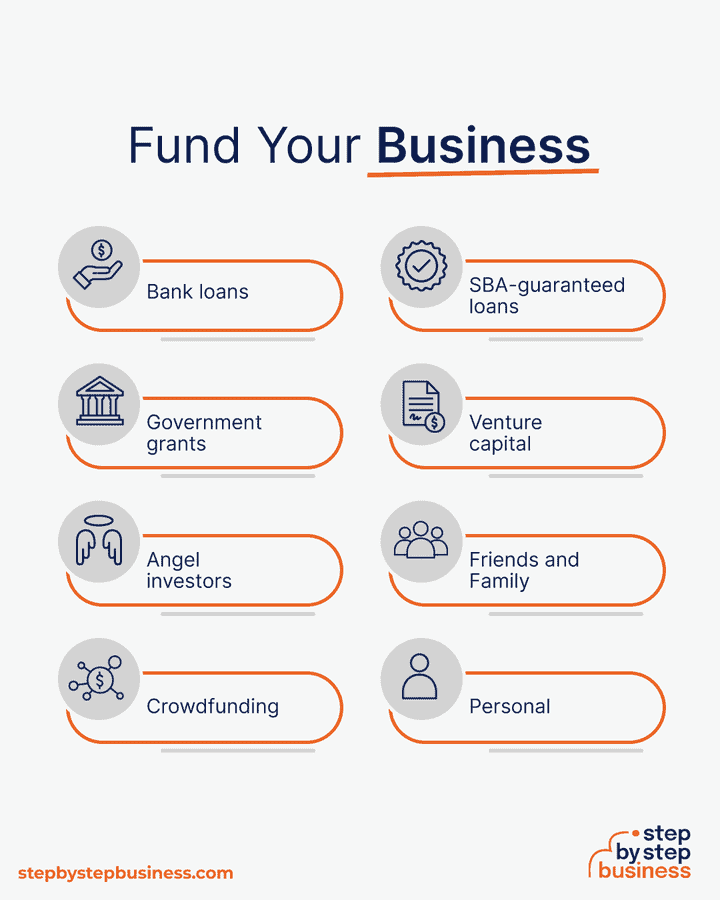
Bank and SBA loans are probably the best option, other than friends and family, for funding an RV park business. You might also try crowdfunding if you have an innovative concept.

Starting an RV park business requires obtaining a number of licenses and permits from local, state, and federal governments.
You’ll need the proper zoning permit from your state. Check with your state and local governments before you purchase the land so that you know they will allow an RV park.
Federal regulations, licenses, and permits associated with starting your business include doing business as (DBA), health licenses and permits from the Occupational Safety and Health Administration (OSHA), trademarks, copyrights, patents, and other intellectual properties, as well as industry-specific licenses and permits.
You may also need state-level and local county or city-based licenses and permits. The license requirements and how to obtain them vary, so check the websites of your state, city, and county governments or contact the appropriate person to learn more.
You could also check this SBA guide for your state’s requirements, but we recommend using MyCorporation’s Business License Compliance Package. They will research the exact forms you need for your business and state and provide them to ensure you’re fully compliant.
This is not a step to be taken lightly, as failing to comply with legal requirements can result in hefty penalties.
If you feel overwhelmed by this step or don’t know how to begin, it might be a good idea to hire a professional to help you check all the legal boxes.
Before you start making money, you’ll need a place to keep it, and that requires opening a bank account.
Keeping your business finances separate from your personal account makes it easy to file taxes and track your company’s income, so it’s worth doing even if you’re running your RV park business as a sole proprietorship. Opening a business bank account is quite simple, and similar to opening a personal one. Most major banks offer accounts tailored for businesses — just inquire at your preferred bank to learn about their rates and features.
Banks vary in terms of offerings, so it’s a good idea to examine your options and select the best plan for you. Once you choose your bank, bring in your EIN (or Social Security Number if you decide on a sole proprietorship), articles of incorporation, and other legal documents and open your new account.
Business insurance is an area that often gets overlooked yet it can be vital to your success as an entrepreneur. Insurance protects you from unexpected events that can have a devastating impact on your business.
Here are some types of insurance to consider:


As opening day nears, prepare for launch by reviewing and improving some key elements of your business.
Being an entrepreneur often means wearing many hats, from marketing to sales to accounting, which can be overwhelming. Fortunately, many websites and digital tools are available to help simplify many business tasks.
You may want to use industry-specific software, such as CampLife, RoverPass, or Campspot, to manage your bookings, maintenance, check ins, and payments.
Website development is crucial because your site is your online presence and needs to convince prospective clients of your expertise and professionalism. You can create your own website using services like WordPress, Wix, or Squarespace. This route is very affordable, but figuring out how to build a website can be time-consuming. If you lack tech-savvy, you can hire a web designer or developer to create a custom website for your business.
Your customers are unlikely to find your website, however, unless you follow Search Engine Optimization (SEO) practices. SEO will help your website appear closer to the top in relevant search results, a crucial element for increasing sales.
Make sure that you optimize calls to action on your website. Experiment with text, color, size, and position of calls to action such as “Book Now”. This can sharply increase purchases.
Here are some powerful marketing strategies for your future business:

Unique selling propositions, or USPs, are the characteristics of a product or service that sets it apart from the competition. Customers today are inundated with buying options, so you’ll have a real advantage if they are able to quickly grasp how your RV park meets their needs or wishes. It’s wise to do all you can to ensure your USPs stand out on your website and in your marketing and promotional materials, stimulating buyer desire.
Global pizza chain Domino’s is renowned for its USP: “Hot pizza in 30 minutes or less, guaranteed.” Signature USPs for your RV park business could be:
You may not like to network or use personal connections for business gain. But your personal and professional networks likely offer considerable untapped business potential. Maybe that Facebook friend you met in college is now running an RV park business, or a LinkedIn contact of yours is connected to dozens of potential clients. Maybe your cousin or neighbor has been working in RV parks for years and can offer invaluable insight and industry connections.
The possibilities are endless, so it’s a good idea to review your personal and professional networks and reach out to those with possible links to or interest in RV parks. You’ll probably generate new customers or find companies with which you could establish a partnership.

If you’re starting out small from a home office, you may not need any employees. But as your business grows, you will likely need workers to fill various roles. Potential positions for an RV park business include:
At some point, you may need to hire all of these positions or simply a few, depending on the size and needs of your business. You might also hire multiple workers for a single role or a single worker for multiple roles, again depending on need.
Free-of-charge methods to recruit employees include posting ads on popular platforms such as LinkedIn, Facebook, or Jobs.com. You might also consider a premium recruitment option, such as advertising on Indeed, Glassdoor, or ZipRecruiter. Further, if you have the resources, you could consider hiring a recruitment agency to help you find talent.

RV parks are wonderful places for travelers to stay and enjoy the great outdoors, and owning one can make for a fun lifestyle. It takes quite an investment to get started, but you should be able to see a nice return on that investment over time.
Now that you know what’s involved, it’s time to shop for land and get your successful RV park started!

Published on December 4, 2022
More than a million Americans live full-time in their recreational vehicle, or RV, and you should know that many of them use their mobility andtheir ...
Read Now

Published on July 21, 2022
The tourism industry is massive and diverse, offering many opportunities for sharp entrepreneurs. You could start a travel agency, a campground, ah ...
Read Now

Published on July 13, 2022
Many major American businesses depend on outdoor activities, such as The North Face or Columbia. But there are also countless smaller businessesthat ...
Read Now
No thanks, I don't want to stay up to date on industry trends and news.
Comments